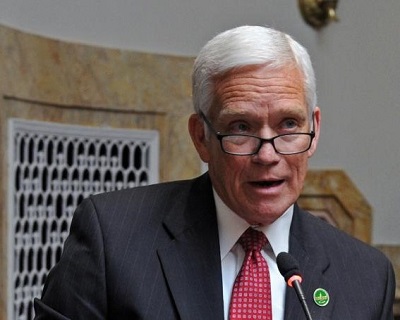
Discussions of bills, budgets, and barber shop choir echoed in the Capitol as we concluded the fourth week of the 2020 Regular Session. While legislation continued to move steadily through the Senate over the course of the week, we were welcomed by a variety of talented constituents in the chamber.
Biennial budget discussions officially began while the Governor delivered his two-year budget proposal to the Kentucky General Assembly on Tuesday. The budget address is one of the first steps in preparing the state’s two-year financial plan. Now that the Governor has outlined his budget proposal, the House of Representatives now gets the first opportunity to move budget bills in the legislature. Once the House passes its budget proposal, it will then advance to the Senate for further discussion and consideration. We still face several weeks of studies, negotiations, and public hearings before we reach an official budget draft. The final budget document will likely look much different than what was proposed this week by the Governor, but the driving force behind it remains the same—we must move the Commonwealth forward on a path that is financially sound.
Senate priority legislation aimed at ending pension spiking, Senate Bill (SB) 6, advanced to the House this week following a unanimous vote on the Senate floor. SB 6 would prohibit state lawmakers who contributed to the Legislators’ Retirement Plan from June 20, 2005, through Dec. 31, 2013, from using salary credited in another Kentucky retirement system to determine final compensation in the legislators’ plan.
Other priority measures moving through the legislative process are Senate Bills 1, 8, and 9. SB 1, also known as the Federal Immigration Cooperation Act of 2020, passed through the Senate Judiciary Committee. SB 1 would require law enforcement and other public agencies to support the enforcement of federal immigration law. The amended version of this bill includes expanded exemptions to local school districts to rape crisis centers, domestic violence centers, and other groups that provide social services.
SB 8 and SB 9 were both passed through to the House this week. SB 8 would amend the current school safety statute to expand school personnel with the designation of a school safety coordinator for each district, one school-based mental health counselor per 250 students, and a trained and certified armed school resource officer. SB 9, also known as the “Born Alive Infant Protection Act,” is a pro-life measure that requires a physician to take all medically appropriate and reasonable steps to preserve the life and health of a born-alive infant.
The Senate passed its first House measure, House Bill (HB) 236, legislation that incorporates federal guidelines, sets requirements for the transportation of products, and establishes testing procedures. This bill included a Senate Floor Amendment, which now requires the House to either approve of the bill in its current form or continue the legislative process required to get concurrence from both chambers. If approved with the Senate Floor Amendment, HB 236 will then head to the Governor’s desk for his consideration.
We also passed a number of other bills in the Senate:
SB 45, legislation to set standards for food nutrition, physical activity, and screen time at childcare centers, passed through the Senate Health & Welfare Committee this week. This measure would require licensed care centers to meet the most recent version of the U.S. Agriculture Department’s food and nutrition standards. SB 79, a measure relating to background checks for school employees who have been assigned an administrative hearing for potential child abuse or neglect.
SB 57 is a bill that amends statue to provide school districts with flexibility in renovations of existing school facilities. It removes the requirement that bottle-fill stations and water fountains be installed for minor renovations. This fix will save school districts money, which is especially important during tough budget times.
SB 64 is also a bill that will enable money to be saved locally, as it provides Commonwealth Attorney’s, & County Attorney’s security against financial liability resulting from the performance of their sworn duties to prosecute state law. Losses will be compensated by funds appropriated through the state Finance Cabinet. SB 64 also applies to the Kentucky Attorney General.
SB 74 provides the authority for a judge to issue a warrant for a blood and urine test in DUI cases. Current law only permits a warrant to be issued if there is a death or serious injury involved.
SB 79 makes some clarifications to 2017’s SB 236. It defines what is considered to be a “substantiated” case of child abuse or neglect. A “substantiated” case would be a case where a ruling was upheld, or that was not appealed. The bill would maintain the requirement that an employee self-report substantiated findings to the Cabinet for Health and Family Services, while also ensuring due process for employees accused.
SB 94 Updates Kentucky law to comply with federal regulations, which changed last year to allow gasoline blended with up to 15 percent ethanol to be sold year-round.
To those who have reached out to my office in the past weeks, thank you for staying engaged during these early weeks of session.
To those who have reached out to my office in the past weeks, thank you for staying engaged during these early weeks of session. It’s an honor to serve you in Frankfort.
If you have any questions or comments about the issues or any other public policy issue, please call me toll-free at 1-800-372-7181 or email me at Stephen.Meredith@LRC.ky.gov. You can also review the Legislature’s work online at www.legislature.ky.gov.








